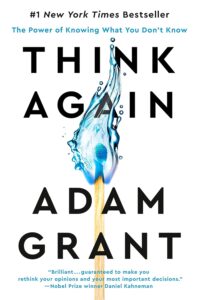What We’re Reading: “Think Again: The Power of Knowing What You Don’t Know” by Adam Grant
Think Again: The Power of Knowing What You Don’t Know by Adam Grant
The importance of unlearning, rethinking, and staying open-minded
 For this newsletter’s edition of What We’re Reading, we decided to do something different: instead of one staff member reading and reflecting on a book on her own, a book club was established! All (two) staff members read the same book and met to think out loud about it together. Our inaugural book, Think Again: The Power of Knowing What you Don’t Know by Adam Grant, was chosen by Program Director, Kathleen McCarthy.
For this newsletter’s edition of What We’re Reading, we decided to do something different: instead of one staff member reading and reflecting on a book on her own, a book club was established! All (two) staff members read the same book and met to think out loud about it together. Our inaugural book, Think Again: The Power of Knowing What you Don’t Know by Adam Grant, was chosen by Program Director, Kathleen McCarthy.
In Think Again, Adam Grant, an organizational psychologist, top-rated professor at Wharton, best-selling author, and one of the world’s 10 most influential management thinkers, explores the process of – and benefits to – unlearning and rethinking. Pulling together wide-ranging studies and personal stories, Adam makes a compelling case that by eschewing comfort and conviction in favor of curiosity and, at times, discomfort, we can change both ourselves and the world.
He suggests that there are four roles we can assume: scientist, politician, prosecutor, and preacher. It would benefit us to act as scientists are trained to do – to ask questions and revise our opinion based on new information. However, all too often, people prefer to cling to their beliefs and slip into the role of a preacher delivering sermons to protect and promote their beliefs, a prosecutor determined to find flaws and prove the other side wrong, or a politician campaigning for support and approval.
Both Kathleen and I enjoyed this book, and we hope you enjoy the snippets of our conversation below:
Christina: Thank you for taking the initiative and choosing a book for us! What made you pick this one?
Kathleen: I’ve been a casual fan of Adam Grant’s work for some time and was reminded of him more directly during Kelly Medinger’s farewell address to the Board. I had been thinking of ways to do a team building exercise since we are going through a leadership transition. I was looking for something to ground and guide us through the transition. I’ve been here for 16 years, and worked with Kelly for 12 of those years, so her departure marks a big change. You get into a routine, and when that routine is upended, it presents an opportunity to examine your ways of thinking. I thought this book would be perfect – and a good way to give us a common language to think differently.
Christina: It was indeed. What did you like about it?
Kathleen: It was written in a very approachable style, and I like that he broke out the four personalities – the preacher, prosecutor, politician, and scientist. I liked that framing a lot. We got the book as a group around the holidays and I used those lenses to look at my family and how we relate to one another, how we go in and out of roles, and to take a look at myself and how I fit into that. How about you?
Christina: I thought the main message, to be aware of what you don’t know and open to learning and understanding, is really important right now. The internet was meant to increase knowledge sharing and understanding and in some ways it has, but in other ways the opposite has occurred. We are increasingly polarized, siloed, and unmotivated to seek out challenge networks.
Kathleen: I agree. With the internet, we’re all armed. I’ll be having a conversation, but I’m not paying attention to what the other person is saying because I’m looking for articles online to support my opinion. It’s like “boom boom here’s all my data”. We now have this world of factoids available to us at all times, and we’ve stopped really listening to each other, we’re just lobbing data grenades at each other. I’m guilty of it and you don’t get anywhere with it. A productive conversation is a dance, not a battle. This book helped me see that the best question to ask is how? Can you tell me how you came to that decision? Walk me through the steps. It’s not a question I ever think of asking, but it leads to more learning and better understanding for both sides than an exchange of facts.
Christina: I completely agree. Regardless of whether two parties agree in the end, if you can come out of a conversation feeling like you approached it with curiosity and respect rather than in preacher, prosecutor, or politician mode, the relationship will be better and you’ll feel less gross afterward. Any other takeaways?
Kathleen: I’m a reluctant skeptic at heart so I have a hard time imagining that open mindedness is a teachable skill once someone is a fully formed adult. What’s the best way to teach open mindedness?
Christina: I think it’s by modeling it, and hoping they respond in the same way.
Kathleen: I agree, and I think creating a challenge network is important as well. Things change, and it’s important to seek out those new ways of thinking and stay receptive to them.
Christina: I love that, and Adam Grant touches on that as well. One of my favorite quotes from the book is “We laugh at people who still use Windows 95, yet we cling to opinions that we formed in 1995.”
On that note… happy rethinking from the Knott Foundation!
